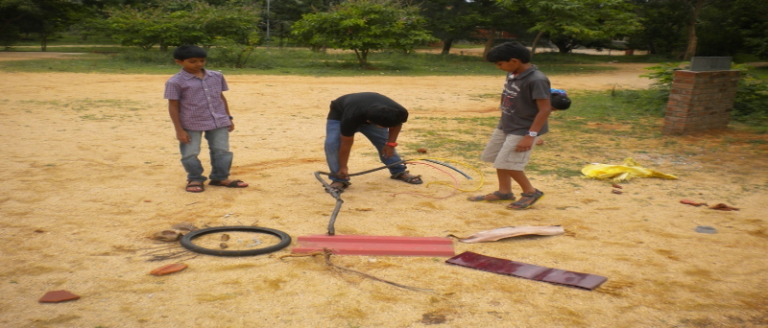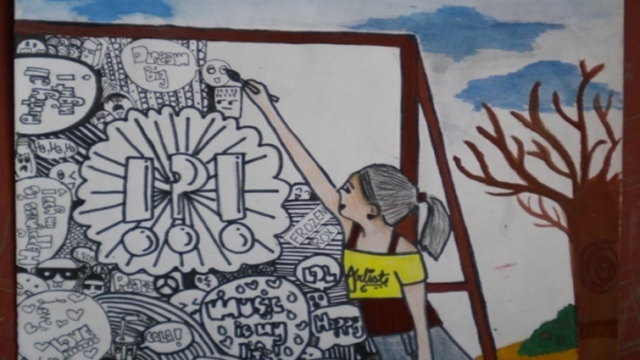FROM THE TEACHER’S PODIUM
The present education system lays central importance on examinations depriving learners the opportunity to unfold their potential in innovative styles. Can we rethink assessment to suit the demands of the learner?
Arvind Dhondphale is working with an Alternative School “The Peepl Grove School”. His area of interest is Child art.
The art of learning is the most important aspect of education. From the moment of birth till the time of death, just like the flow of a river the process of learning never stops. In the mainstream process of education both the teacher and the student have separate and quite demarcated roles that they are expected to play. The teacher needs to make sure from time to time that the student is grasping what is being taught. There are various forms of assessment used by teachers depending upon what is being assessed. The most common and widely used criterion for assessing students is written examination.

Examinations are systems designed to judge the standard of learning. Examinations in their most mainstream form test merely the intellectual or analytical component of learning. However children are full of potential. They are capable of expressing themselves through various ways. How is it possible to assess them with a single form of assessment, which deals only with words and language? The world around us is full of life.
It is vibrant and to experience it we are gifted with various senses. Each sense offers us a unique aspect of learning. Deep learning depends upon the sensitivity of our senses and our ability to use them. To assess these different levels of learning we need multidimensional criteria. Otherwise it is impossible to know about the various hidden aspects and potentials of a person. Every child has his own level of learning. It’s not easy and fair to generalize the assessment criteria. Hence more creative criteria are needed to understand the various aspects of a person.

The criterion varies for different levels of learning and that is why a single criterion cannot work for different levels of learning. If we glance back we see that the examination system in India has evolved from the British education system. It originated to be able to fulfill the need for clerks to work under the British officers. Creativity and criticality are not entertained in such a system.

Unfortunately even post-independence the same system has been continuing and not many significant changes have been made in order to include the possibility of creative and reflexive learning.
Moreover the uncontrolled population growth has made the system even more complicated in terms of occupational pressure, dearth of quality institutions and scarcity of employment opportunity.
Once, in an interaction I tried to know from the students their perspective on what education means to them. Most of them shared the same viewpoint, i.e. to get better jobs or careers and based on that they felt they would be able to understand themselves. So it meant that a hierarchy of first education followed by job, then better job and so on ….will help them understand life and the self.
I feel that exactly the opposite should happen. Education should help the child to understand herself first and later as an obvious result or even as a by product it will help them to follow the necessary pursuits.
It is not just students. The whole society shares this viewpoint like an obsession. Children are surrounded by people who live their whole life with this perspective. Hence the importance given to examination is inevitable. We can call it the almighty exam system.
Understanding the child is a fundamental requirement
Better efforts are needed to understand the child. There is lack of awareness regarding the need to understand the child. In this regard the parents, the educators and the institutes do not have an understanding amongst each other. The situation is like that of a battlefield. Most of the time, it is observed that the schools are not interested in interacting with the parents to understand the child. Isn’t it fundamental that the child be understood? Otherwise the whole idea of education will be vain.
The involvement of the parents is as important as that of the teachers.
Like teacher training, parent training’ is also important. The absence of this basic requirement creates big issues in the development of the child. And the child is left to the mercy of parents and teachers.
Nature: the forgotten teacher
Humans are inseparable from ‘nature’. It is so sad that in this whole process of ‘education’ we keep forgetting one of our biggest gurus and that is ‘nature’. The modern education system has separated humans from nature. It has planted such ego in man that he has started thinking that he is the most powerful creation and nature is for the fulfillment of his will. This disastrous thought process has put life on the planet at stake. It has made human life synthetic.
Education is not able to connect the child to nature. On the contrary ‘educated people’ are destroying nature for their convenience or for luxury. Developing a relation with nature at an early age develops a bond with nature. The person, who is connected with nature, will never even think of destroying it.
In this discussion I am just trying to point out some other important aspects of education. These important aspects are ignored when education related activities are forcefully dominated by the examination system, and when it becomes the only assessment tool. Many dangerous side effects like fear, nervous breakdowns as a result of exams are always discussed in media and public forums and even then students continue being assessed in that way.
***











